Back to the EHP of PNG: Grant Rattray and Leah Warren visit Papua New Guinea’s Eastern Highland Province
Grant Rattray and Leah Warren visit Papua New Guinea – Sourcing Trip (August 2016)
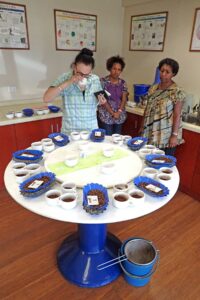
Leah Warren cupping at Monpi Mill
Earlier this month, Mercanta returned for a third trip to the regional capital, Goroka, located at 1,600m in the Eastern Highland Province (EHP) of Papua New Guinea. The town has a population of 19,000 but feels a lot smaller, and coffee is central to the town’s commercial life, serving as a hub for deliveries of green coffee from surrounding dry mills and a base for commercial and specialty exporters whose warehouse line the road which runs parallel to a small but growing airport.
Cupping is central to any of our origin visits, and the first two days we spent cupping our way through a ‘long list’ of samples from smallholder sources and traditional plantations. Timing of trips is planned to coincide with peak of harvest samples, when generally the best quality and consistency in the cup are to be found.
Most of the coffee exported out of PNG is grown by smallholder producers in ‘coffee gardens’ of around 2 hectares planted with around 2,000 trees. These are often inter-planted with leguminous trees, such as Casuarina and Albizia, which provide shade cover for the coffee. There are also a number of conventional plantations, but these declined dramatically in number after PNG declared independence in 1975 and many of the large foreign land owners left the country. Most of these plantations have since been sub-divided and are now managed by ‘block holder’ tenant farmers with labour provided by the extended family. The higher quality coffees that are presented to specialty buyers are labelled Plantation AX (PL-AX), although these are actually produced by small holders and not from larger plantations. The vast majority of PNG’s crop is sold to larger commercial buyers as lower quality ‘Y grade’ coffees.
This season’s coffees range in profile from the malty, mild and biscuit (not dissimilar to fine commercial Brazil) to the very clean, sweet and bright (orange citric) – some even cup like cleaner natural Ethiopians (ripe berry notes, blueberry, stone fruit). Over the first 2 days of cupping, lots from 4 or 5 sources cupped consistently well, and these ‘short listed’ lots are being cupped again at our regional offices/labs in Seattle, London and Singapore. Approved lots will then be instructed for shipment in August and we can look forward to these new crop arrivals being available in store to buyers in early October.
After cupping, we had set aside time to visit the areas where the finer lots were being produced, so we headed east to Kainantu, a market town with the feel of a frontier trading post. Here, Ferro Yasona and his two brothers run the Solwara dry mill, which receives and processes parchment from smallholders in the region. There’s also a small purchasing point immediately outside the dry mill that receives coffee in parchment from local smallholders and pays them cash on the day. Solwara is the pidgin word for ‘salt water’, and the name was chosen to reflect the ambitions of the mill owners to source and process coffees from producers across PNG, from coast to coast.
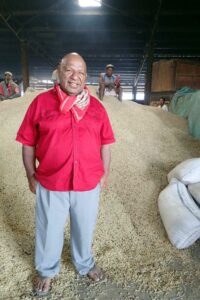
Ferro Yasona
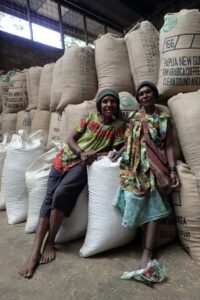
Hand pickers at Solwara
Solwara also has a wet mill that receives ripe red cherry from nearby plantations, which is then pulped, fermented, washed and sun-dried on ‘sails’. The drying is then finished off in large Asaro driers that use hot air provided by furnaces that burn waste coffee parchment from the hulling process. These lots are typically presented to buyers as the higher quality Plantation-AX grade.
From Kainantu, the road continues through the Aiyura Valley and passes the National Agricultural Research Institute (NARI), which manages a coffee research station and model farm established under the Coffee Industry Corporation (CIC). The road continues up into the Nori Kori Valley.
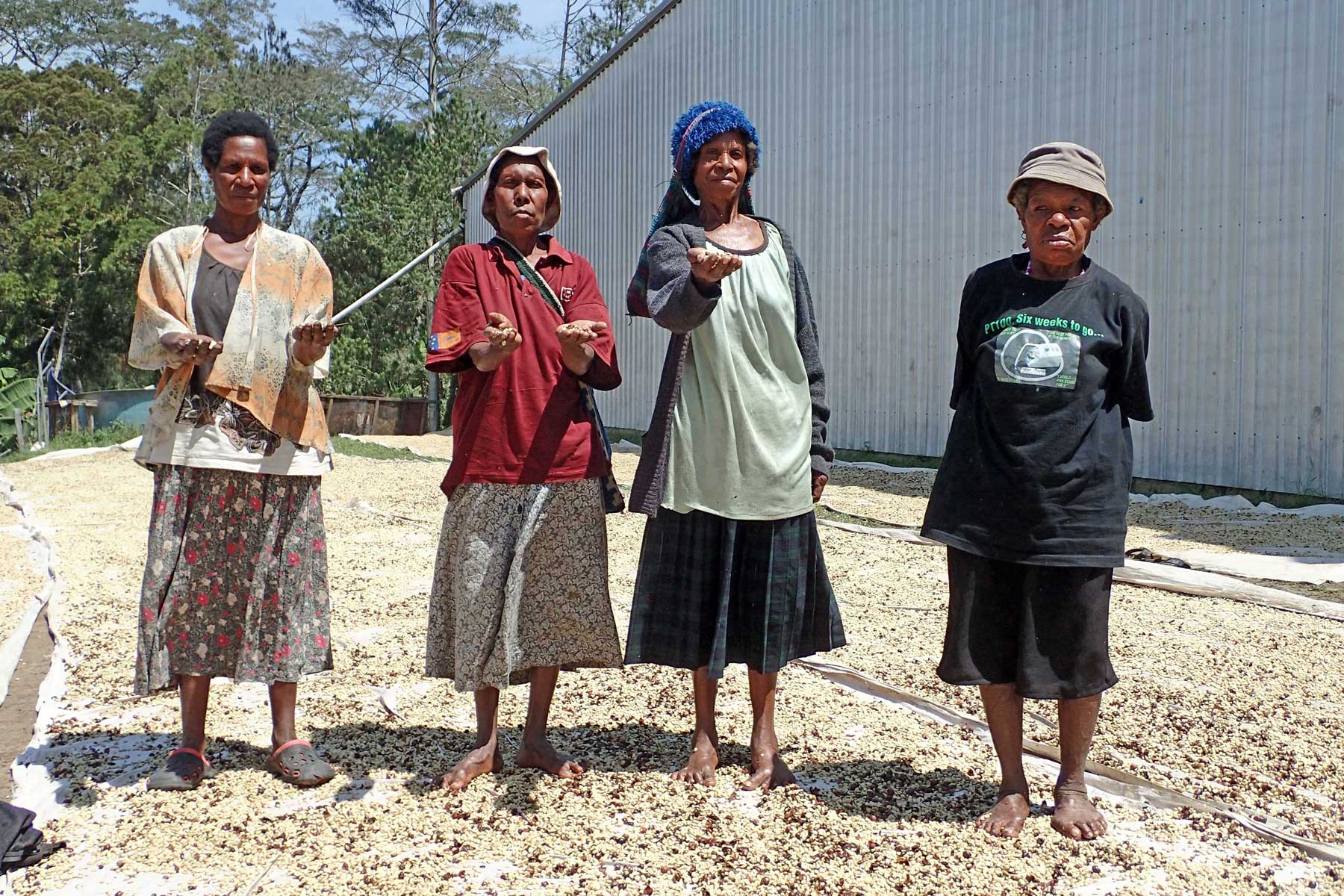
We were met by Ben Akike, a young entrepreneur who is now working with local smallholders to improve quality. Ben is building a new wet mill in the region that will receive daily deliveries of ripe, red cherry from smallholders in the surrounding area. Wet milling, fermentation, washing and drying will be managed on site. This will allow far greater control of quality than the more typical scenario, where smallholders pick, pulp, ferment, wash coffee on a daily basis on their own farms, which is then sun-dried on a tarpaulin (or ‘sail’) and then offered for sale at the roadside to ‘collectors’ who pay the price on the day. The collectors then deliver on to dry mills where the drying is finished and hulling carried out.
Collectors are not simply ‘middlemen’. Rather, they perform a vital role in transporting the coffee from the small producers to the dry mill and are also an important link in the quality control chain, as they will not pay good prices for poorly prepared parchment.
From here, the coffee is sold on to exporters who carry out any final cleaning and sorting before the coffee is offered to buyers either in discreet traceable lots or more commonly bulked into full container load (FCL) volumes of regional coffee.
Ben had one of his farmers with him and Paiks explained the everyday reality of smallholder production in the Nori Kori Valley.
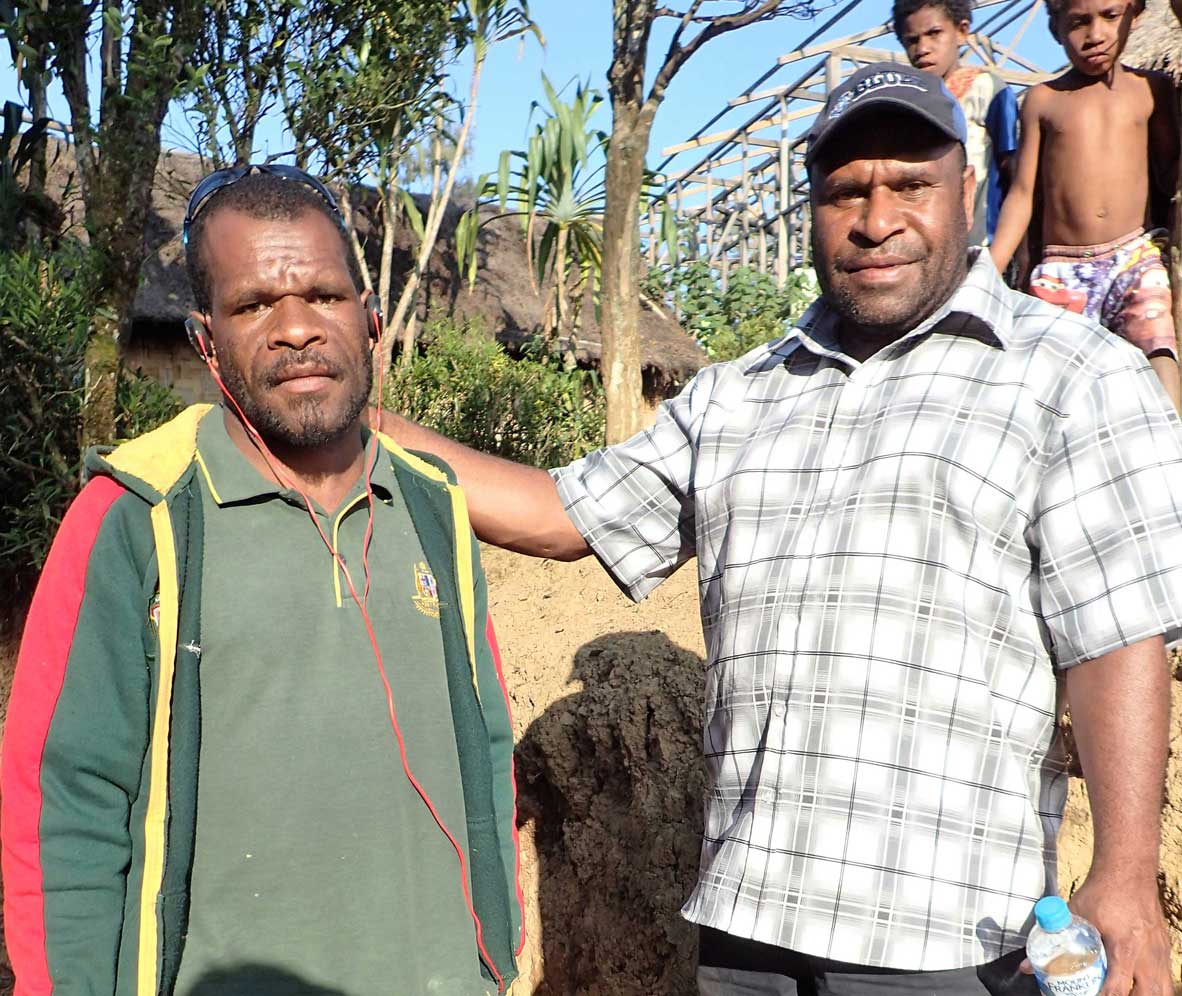 Ben Akike and Paiks
Ben Akike and Paiks
Paiks is typical of the smallholder coffee farmers in the Nori Kori Valley and surrounding region (except perhaps for his headphones which he never takes off). He’s a young man in his 30s but has 3 sons and is already passing on 3 of his 5 small ‘coffee gardens’ so they can take responsibility for their own production and become financially independent in future.
Harvesting is typically carried out by the garden owner and members of the extended family. There is no mechanisation and the ripe red cherries are handpicked daily throughout the peak season that runs from May through to August. The cherries are put through a hand-pulper that same evening. Some more modest farmers press the cherries under a large stone to separate the fruit from the seeds. The de-pulped beans are then fermented for 2-3 days in poly bags or plastic containers. With no running water, the freshly fermented beans are washed in plastic buckets with perforated bottoms in local streams and rivers before being dried on ‘sails’. Most smallholder coffee is then offered for sale to local collectors, but Paiks and the other growers in the neighbourhood now sell to Ben.
During the low season from September to April, Paiks tends his coffee garden, managing the shade cover, replanting, pruning and stumping the coffee plants.
Establishing the new wet mill later this year will centralise the pulping process, bring the benefits of mechanisation and capability for handing greater volumes and will also ensure more even and efficient fermentation and washing for the coffees produced in the surrounding coffee gardens. This, in turn, will drive up quality, values and livelihoods for these smallholder farmers and their families.
The village that Paiks calls home was just a few kilometres further along the road. Life is simple and often beyond the reach of the national electricity and telephone networks. All the inhabitants of the village belong to just two large extended families. Ben always takes the opportunity to talk with the coffee producers, and they gather round to listen whenever we stop.
The long circular road through the mountains was still dry and usable when we were there, but the heavy red clay soil was already beginning to cut up with the first rains of the wet season and in places was almost impassable. The rains can make access in and out of the farming communities difficult even for 4×4 vehicles, and many villages can be cut off weeks at a time.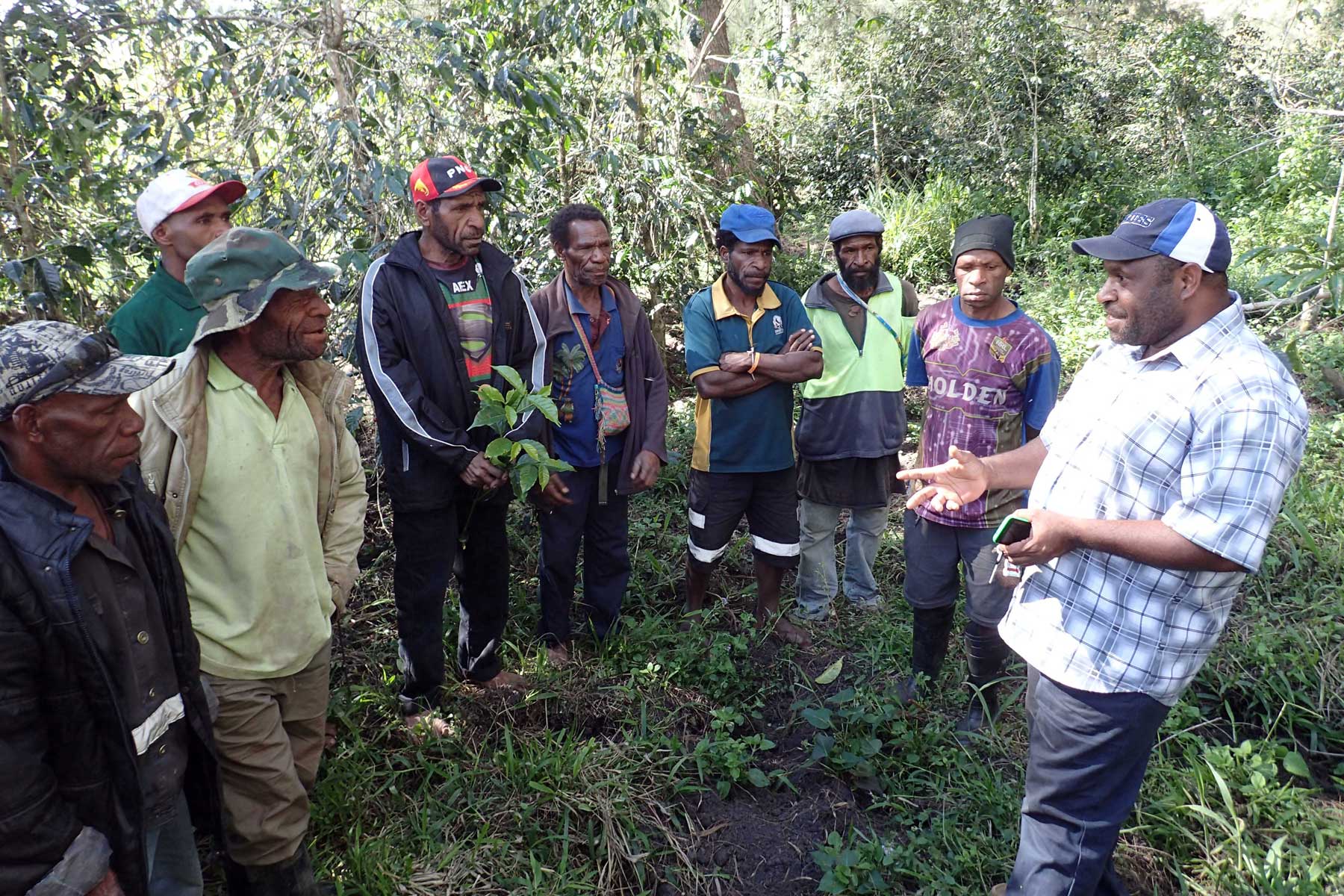 Ben & growers / Paik’s village
Ben & growers / Paik’s village
Coffee is vital to the economy of PNG and provides employment and income for a large percentage of the population. Improving the quality and the value of country’s primary cash crop is vital if livelihoods are to improve. A first step in this process is the auditing of smallholder groups by certification bodies such as Fairtrade, Rainforest Alliance and Utz. This provides a means of benchmarking quality and establishing best working practices. This, in turn, can elevate quality from commodity grade to speciality grade – which can be transformative. It’s also critical is establish the traceability that specialty buyers seek and that allows them to return in successive years for the same coffee from the same community.
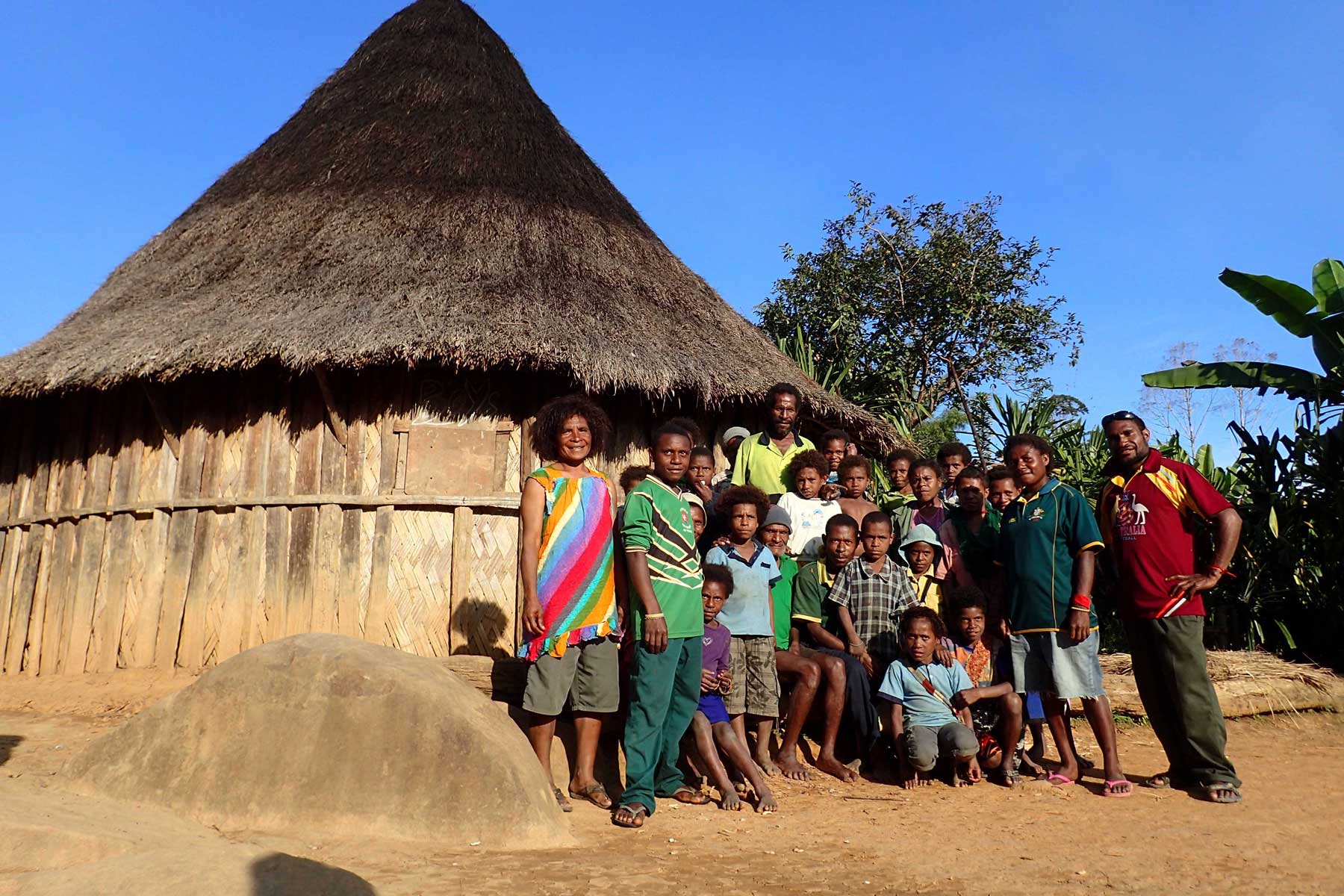
Sustainable Management Services (SMS) has taken up the challenge of providing extension services to coffee producers throughout PNGs major growing regions. These services are necessarily adapted to the realities of life in the country. For example, there’s no centralised farmer training centre (as SMS runs in some countries), as distances, lack of transportation, fines and the cost of accommodation once there make travel to such a location unworkable. Instead the extension workers spend days or weeks at a time in the coffee-producer communities and hold ‘coffee nights’ where growers gather to share experiences and learn best practices or SMS extension workers. This private sector initiative is steadily improving yields and driving up quality and value for thousands of small producers. It also means a cleaner and more consistent cup for the increasing number of commercial and specialty buyers who are now looking at this origin as a new store of value and with much untapped potential.
We’re looking forward to cupping the selected new crop samples in our own cupping labs and instructing shipment of the best lots to our warehouses in the USA, UK and Singapore. And we’re keen to see how these are then taken up by specialty coffee roasters who are seeking something a little less tried and tested and a little more off the beaten track.
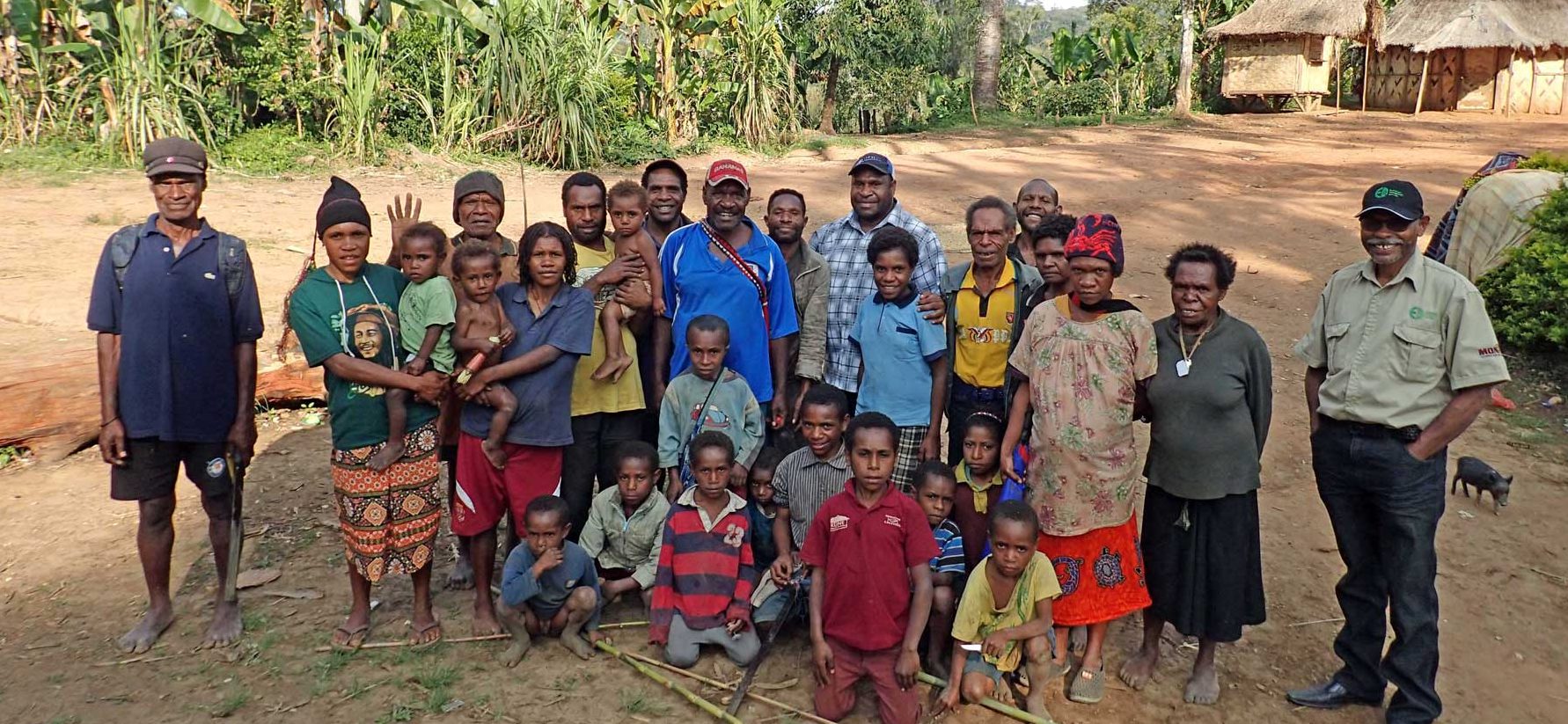
About the Authors:
Grant Rattray is the head of Mercanta Asia, Singapore. He’s worked in Specialty coffee for over a decade, including 2.5 years as Director at the Alliance for Coffee Excellence and Mercanta, where he has been instrumental in widening the sourcing net to include many new and exciting origins.
Leah Warren is the Regional Manager of Mercanta North America Seattle. She worked in specialty coffee for many years before opening our Mercanta North America offices in 2008.
Leah and Grant are avid photographers and are responsible for many of the excellent images you see across the Mercanta website.